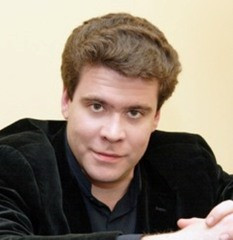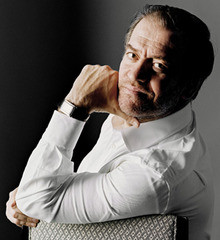|
Back
Weapons of Mass Elation New York
Isaac Stern Auditorium, Carnegie Hall
01/28/2015 -
Rodion Shchedrin: Concerto for Orchestra No. 1, “Naughty Limericks”
Pyotr Ilyich Tchaikovsky: Piano Concerto No. 2 in G Major,, Opus 44
Sergei Prokofiev: Symphony No. 5 in B-flat Major, Opus 100
Denis Matsuev (Pianist)
Mariinsky Orchestra, Valery Gergiev (Music Director and Conductor)

D. Matsuev (© Audrey Mastafaev)
If Valery Gergiev is as good a pal to Vladimir Putin as the dozens of protestors outside Carnegie Hall were hollering, then he would take Russia’s ten most eccentric physicists, astrophysicists, biologists and futuristic cosmological engineers, put them in a room with the Mariinsky Orchestra and Denis Matsuev, and conduct the artists, as he did last night, in Tchaikovsky’s Second Concerto.
Hopefully–almost certainly– those mad Russians would harness Mr. Matsuev’s endless quanta of concentration, vehemence, brute force and virtually impossible muscularity, then transmute this energy into and unstoppable armed weapon, thereby saving the Russian Military a few billion rubles in the process. Mr. Matsuev, you see, was last night’s weapon of mass destruction.
Let’s get serious. The reason why Tchaikovsky’s Second Piano Concerto is hardly ever played is not necessarily its inferiority to the First. It’s that 134 years after its composition, nobody really can play it. The composer, not being a great pianist, simply let his imagination run away with him. The result is that those who play it usually cut out lots from the first movement cadenzas and then excuse it as “cutting for length.”
Not, though, Denis Matsuev. He played the complete concerto, and nothing stopped him. Not the 32nd-note double octave runs, not the fierce thundering multiple chords, not the insane finger work that the composer could have put as revenge for mediocre artists.
His arrival on stage, muscular, taller than Gergiev, foretold some mighty playing, and from the first notes after the orchestra, he never stopped in this movement. True, Tchaikovsky called it Allegro brilliante, but this brilliance was more ruthless than radiant. It was hard-nosed and hard-fingered, the movement was thunderous, endlessly explosive, with one volatile episode after another.
One doubts whether a serious critic would have time to consider whether it was “good” or not. Matsuev became Thor, hurling his thunderbolts at us before we could duck for cover.
The second movement was a shock of calm, but no thanks to Mr. Matsuev. Rather it was one of Tchaikovsky’s most inspired moments, where solo violin and solo cello (Stanislav Izmaylov and Oleg Sendetsky) played a duet that was partly Swan Lake, partly double concerto. When Mr. Matsuev made his entrance, it was soothing enough, but obviously the pianist needed more to say.
Not only did he say it in an appropriately furious finale, but this time, the relentless performance was–usually–more in sync with the style. Not entirely, though. The dour-looking composer probably smiled at his invigorating peasant tunes here, but Matsuev never cracked a pianistic grin.
Once again, this was thundering music even at its supposed lightest. If those scientists transformed his playing into weapons of mass destruction, we were so astounded at the demonically driven performance that simple fantasies would be irrelevant.
Apparently Mr. Matsuev loved it (as we all reflexively did!), for he gave two long encores, the Scriabin D-flat Minor Etude, and a Rachmaninoff Etude-tableau, both played faultlessly. And unlike the Concerto, played humanly as well. (It was an evening for encores, since Gergiev did the most silken-smooth excerpt from Swan Lake.)
The opening of the three Russian works was by Rodion Shchedrin, whose name is inexplicably rare here. I first came to love Shchedrin listening to–what I thought–was a suite from Carmen. Except that Bizet’s music frequently went completely off the rails, made detours to happy dissonances. This was Shchedrin’s work, and he has fascinated me ever since.
The “Naughty Limericks” short Orchestral Concerto was like Milhaud’s Kentuckiana, where the French composer played about 30 Kentucky folk songs at the same time. The Shchedrin work is equally a series of the most intricate quodlibets of songs (many of them apparently Spanish), with the seven-man percussion section and the brass outdoing themselves., It was nine minutes of furiously delicious music.

V. Gergiev (© Marco Borggreve)
Finally, it was time for Valery Gergiev to show his stuff as a conductor, not overshadowed by pianist or composer. The Mariinsky Orchestra, with its hard-driving strings, hard-timbred clarinet solos and fervent percussion was the ideal setting for the Prokofiev Fifth Symphony, and their color, virtuosity, brilliance was on show.
This was, however, a most idiosyncratic performance. The tempo in the first movement was not only rapid, but crazy rush in the coda seemed part of the same headlong fabric. Yet, speedy as it was, the orchestra blasted out, every instrument could be heard. I felt myself feeling that the exact same dynamics would be so much better if he relaxed a bit.
The same tempo was more fitting in the second movement, though there was little marcato in the Allegro marcato. The slow movement was faultless, save that Mr. Gergiev rushed an ending which is marked to be only slightly faster than the rest. Of course the finale, such a palette of color and velocity, was played with the right hues, and speed of light.
If one thought that Mr. Gergiev was leading his pack so hurriedly because he had another orchestra to conduct last night (the man leads so many orchestras he makes Ozawa in his prime seem like a couch potato), that was wrong. He, like Matsuev, had his own concept, his own feelings, and they both had the gusto and genius to invoke appropriately wild appreciation from the audience.
Harry Rolnick
|